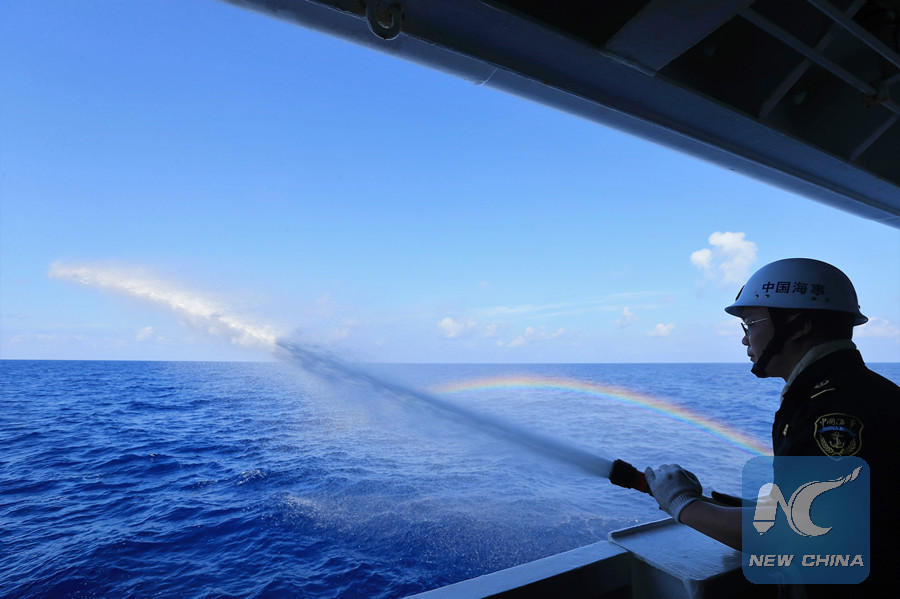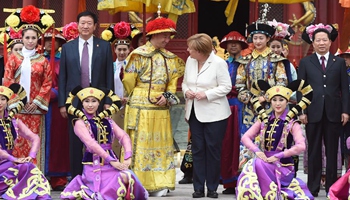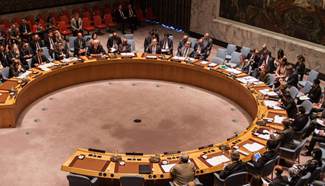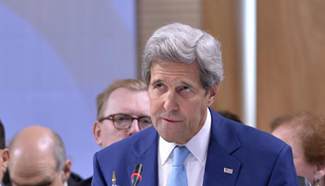
A crew member takes part in a fire drill on China's largest and most advanced patrol vessel Haixun 01 on the South China Sea, April 4, 2016. (Xinhua/Xing Guangli)
GRONINGEN, The Netherlands, June 14 (Xinhua) -- The arbitral tribunal in the Philippines' South China Sea (SCS) arbitration exceeded its competence by circumventing the real disputes and by degrading the role of States, such arbitral expansion is detrimental to the settlement of disputes, said Haibo Gou, legal advisor and counsellor at the Chinese embassy in the Netherlands.
The Philippines, which illegally occupied some of China's islands and reefs in the SCS in the 1970s, unilaterally filed the arbitration in 2013.
The Philippines raised 15 submissions, on China's U shaped line, on the entitlements of several maritime features, and on the legality of China's activities in the SCS.
The Philippines asserted that these submissions are irrelevant to the territorial and delimitation disputes. And the arbitral tribunal endorsed such assertion with a ruling in October 2015.
Using a graph indicating the relationship between relevant dispute settlement process and the Philippines' submissions, Gou remarked that the settlement of territorial and delimitation disputes is an integral process.
"Territorial dispute needs to be addressed first, to be followed by the settlement of delimitation dispute. Only with the territory and delimitation disputes settled, could the question of legality of activities in disputed area be answered. The Philippines' submissions are either part of or dependent on the territorial and delimitation disputes,"he said at a lecture at Groningen University on Monday.
"Entitlements of maritime features are granted to coastal States. With the territory dispute in the SCS pending, who is the coastal State cannot be answered, the issues of entitlements cannot be addressed. Further, according to established jurisprudence, determinations on entitlements are the first step of any delimitation. Thus the submissions on entitlements are subsequent to the settlement of territorial dispute, and are part of delimitation," he explained.
"Territorial disputes are not the subject matter of the United Nations Convention on the Law of the Sea (UNCLOS), and China has declared under the Convention that it does not accept compulsory procedures with respect to disputes concerning delimitation. There is no compulsory jurisdiction over disputes in the SCS," the Chinese diplomat told scholars and students attending the lecture in the north of the Netherlands.
In his opinion, the arbitral tribunal exceeded its power because firstly, compulsory arbitration is "subject to" China's declaration made under the UNCLOS.
"With China's declaration, the establishment and functioning of the arbitral tribunal has no legal basis," he said.
"The tribunal has further exceeded the limits of arbitral power when it failed to fulfill the duty of isolating real disputes," he added.
The diplomat noted that States shall be alert about the ad hoc organ's performance, which is a typical example of arbitral expansion.
"According to the Convention, States have the right to exclude compulsory procedures with respect to delimitation disputes," he said.
"The five arbitrators understand delimitation in a very narrow way, thus restraint such right of States. Also, the tribunal restrictively interprets the agreement between China and the Philippines to exclude UNCLOS procedures, and degrades the role of negotiation and exchange of views. By degrading the right and role of States, the tribunal acts beyond its mandate," he said.
"The arbitral expansion cannot help settle the real disputes because an ultra vires award is null and void. What's worse, the arbitration is inconsistent with procedural justice," he said.
"We should never forget that States play a primary role in international justice and relevant judicial or arbitral organs are based on State consent as reflected in the UNCLOS. When an arbitration exceeds State consent, it breaks the balance inherent in the Convention," he stressed.
To avoid the harms of judicial/arbitral expansion, Gou suggested that States shall rebuild trust toward good faith negotiation, and provide necessary procedural guidance to judicial and arbitral organs, and the latter shall be self-restraint in keep the limits of State consent.
Citing the "Judgment of Solomon" story, the Chinese diplomat emphasized that more wisdom is needed to safeguard the balance and integrity of the UNCLOS.
"When King Solomon ordered to split a baby and give each claiming 'mother' a half, we realize that the real mother will not let her baby hurt. Similarly, real owner of maritime features will not attempt to reduce the capacity of its features. With the arbitration, the Philippines endeavors to reduce the capacity of maritime features in the South China Sea, which tells that it is not the owner of these features," he explained.
In addition, "in the Solomon Judgement story, the false mother insisted on proceedings to divide the baby. Thus we know that the party insisting on proceedings may not always be the one with truth. Therefore, we should refrain from an easy conclusion that he who undertakes an arbitration is always the one who is right."
China has said repeatedly that the right path forward regarding the disputes in the SCS is consultations and negotiations between directly concerned parties.
Related:
Spotlight: Experts say China's stance on South China Sea arbitration fully justified
BEIJING, June 10 (Xinhua) -- The Philippines' unilateral move to bring a maritime dispute with China to an international tribunal won't help resolve the problem and the right way forward is to seek settlement through bilateral talks, several foreign experts told Xinhua in recent interviews. Full story
Interview: Manila intensifies tension in South China Sea -- former diplomat
MANILA, June 9 (Xinhua) -- The Philippine government has been behind the intensifying tensions in the South China Sea, a former diplomat of the country told Xinhua on Wednesday.
Alberto Encomienda, former secretary-general of Maritime and Ocean Affairs Center of the Philippine Foreign Affairs Department, said: "China has been for the negotiations all along, but from the beginning we are not." Full story











